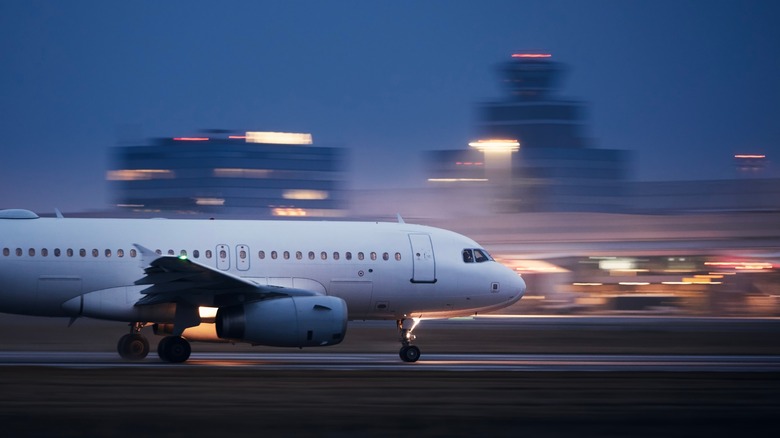For anyone who’s flown, spending time in an airport is one of the most forgettable parts of the journey. These transit hubs exist largely as a means to an end, a location that travelers have to access in order to get to where they really want to go. As such, airports tend to champion function over form, and many have the same unremarkable facilities that make them wholly interchangeable — stark lighting, utilitarian color schemes, bland, soulless concourses, and a distinct lack of joie de vivre.
That’s not surprising considering that there are tens of thousands of airports around the world, and most of them are designed to be ports that shuttle people in and out, over and over again. But not all airports are made the same, and some have facilities and amenities that really stand out, which might make them destinations in themselves. If you are looking for places that can inject a little joy in the moments before departure, here are some airport sites you might want to linger a little longer before your next flight.
Amsterdam
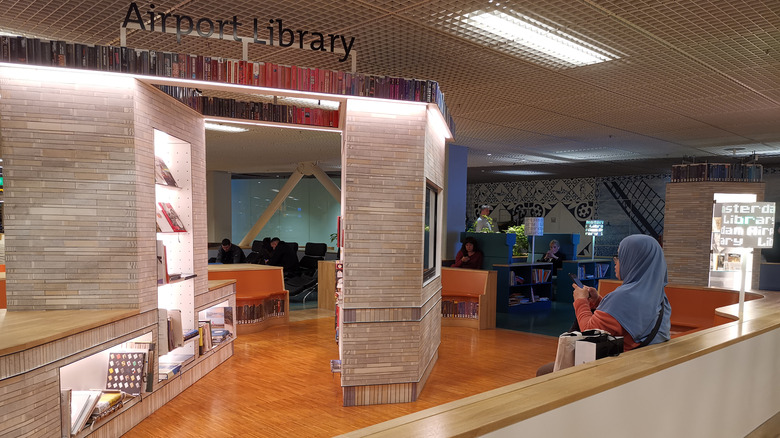
The airport for the Dutch capital, Schiphol, is located only a short distance from the city center, making transfers into the heart of Amsterdam easy. The train into central Amsterdam only takes about 15 minutes, so even passengers stuck for a few hours on a layover can effortlessly get out and explore. That said, you don’t need to visit the city to familiarize yourself with Dutch culture.
In the airport itself, visitors can find a comfy perch in a library that showcases the literary tricks and travels of Dutch authors, with novels available in a whopping 40 languages. There are also photo books that are great to flick through when time is pressing. And it’s not just books that are free to browse, but also touchscreens presenting materials and interactive tablets, perfect for visitors who don’t like the look and feel of a paper tome.
The library also hosts talks about Dutch culture and stage performances by local musicians and composers. The library can be found in Holland Boulevard, a section that seeks to bring Dutch culture to the international, jet-setting crowd. It’s also where iconic Dutch items are for sale (tulips, cheeses, and local tchotchkes) and where there is a gift store of the Rijksmuseum — the pre-eminent museum in the country.
Central Japan
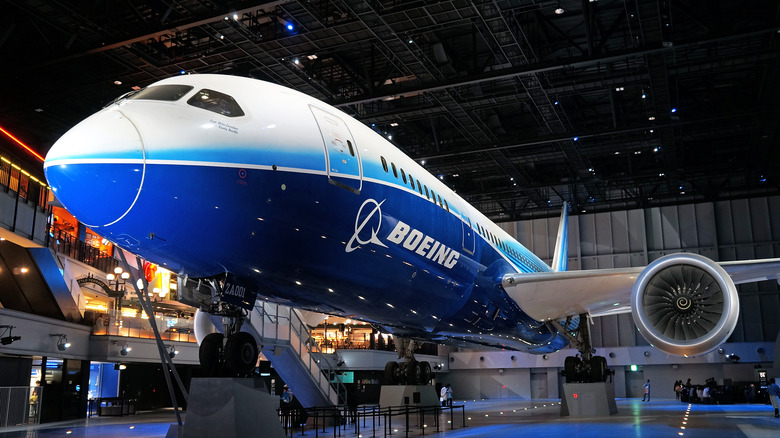
Located south of Nagoya, between Tokyo and Osaka, Chubu Centrair International Airport sits on its own man-made island. It is a busy hub, with flights that serve destinations within the country and beyond. While many international travelers might fly into Tokyo or Osaka, a stop at this airport will bring them to a unique attraction that couldn’t be more appropriately located — an airplane theme park. In the shadow of cafés and restaurants in the airport terminal, Flight of Dreams is a fantasy come true for aviation fans. The centerpiece is the first ever Boeing 787, not a scale replica or model mock-up, but the actual plane.
Display panels and clips on screens, set by various parts of the vessel, explain the workings of the giant piece of aeronautic machinery. Visitors can get a close look at the cockpit and engines and learn about careers in the aviation industry. Travelers who want to try flying can book a session at the flight simulator. For families with youngsters, the kid’s area has play pods, climbing frames, a rope course, and more. Most of the park is free to visitors, making it an incredibly attractive and cost-effective proposition.
Frankfurt
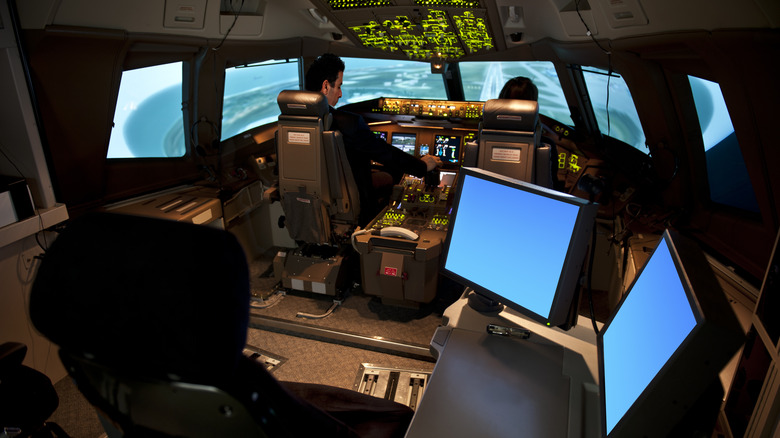
Baranozdemir/Getty Images
Visitors to the airport of this German city will be able to get into the swing of life in the aviation industry thanks to the various amenities here. The flight simulator will thrill adults and kids, with travelers captaining a Boeing 737 from a replica cockpit. Once strapped in, they can feel what it’s like to handle such a mammoth aircraft and can choose to land or take off from Frankfurt airport or one of hundreds of other airports on continents across the world. An actual pilot will be in there with you, ensuring you are pulling, pushing, and pressing the right knobs, levers, and pedals while covering the key measures to ensure safe flying.
Kids need to be 12 or over to participate; for those aged between 5 and 11, there is a kid simulator option, where young ones will still have access to controls and monitor screens during their take-off and landing maneuvers. Elsewhere, a stop at the Fraport Visitors’ Center will allow travelers to pore over a large model of the airport and try their hand at guiding in a taxing plane on a screen. They can also don a VR headset to re-enact the journey of a suitcase as it speeds through the airport’s baggage-handling facility.
Hong Kong
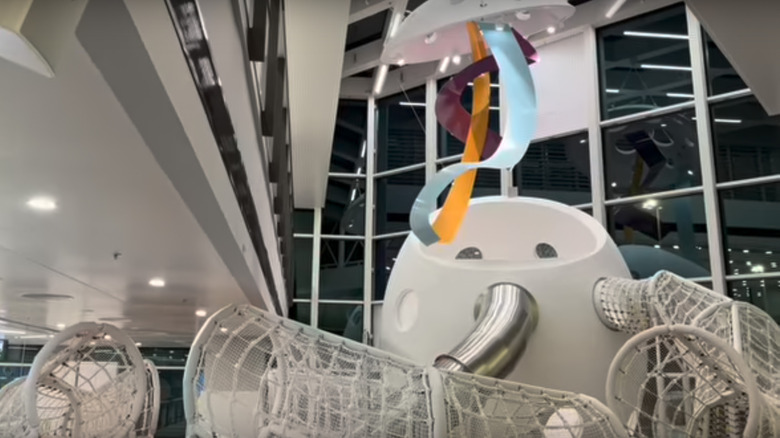
HK Stuff Channel / YouTube
This bustling territory in East Asia is home to the busiest airport in the world regarding cargo processing. Still, Hong Kong International Airport is also a pretty lively place for passengers. It’s the hub for Cathay Pacific Airlines, which flies to nearly 200 destinations from here. For visitors with young children, the airport has shops and places to eat that the whole family can enjoy, but it also has one spot that is especially appealing to youngsters.
Situated in the East Hall of Terminal 1, Wonder Eggshell is a bright, light, airy playground, a welcoming web of wonder that invites kids to explore — and expend energy before a flight — and keep themselves engaged. The focal point is a large eggshell structure that forms the core while bits extrude from it like tentacles. Aimed at kids aged 6 to 12, it has nets that youngsters can clamber on, tunnels, slides, and ribbons in bright colors, adding a visual punch to the predominantly white environment. In addition to the physical play areas, digital games themed around birds allow kids’ minds to wander further.
Mumbai
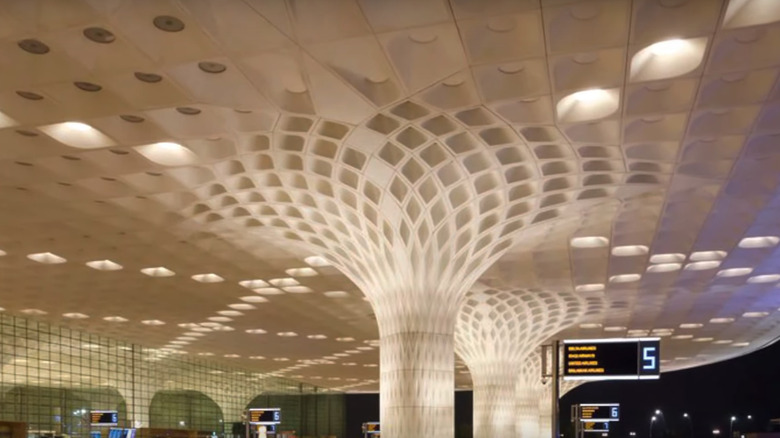
Minty Lemon / YouTube
There is a real sense of heritage at Chhatrapati Shivaji International Airport, the main hub serving India’s largest city. Terminal 2, completed in 2014, brought a cleanly designed interior that resembles a forested canopy of trees. The Jaya He, GVK New Museum is not just a vibrant expression of Indian art but a deep look at the country’s culture, from coast to coast, sea to mountain. Skylights flood the space with natural light, and the wall is blanketed with thousands of bits of art and artifacts representing every part of the country. The variety is astounding and fascinating, with paintings, textiles, sculptures, and more banded together to create a large-scale installation, a visual encyclopedia of artistic expression.
The wall runs and runs for miles, literally (it is 2 miles long), and travelers wandering along it might see glorious artifacts. These include porches, carts pulled by bullocks, chariots from temples, sculptures of celestial beings, ornate doorways, and much more. Since the items on exhibit vary in age and original location, this really is a journey through India’s many times and spaces. Expect more cool amenities at the new international airport in Mumbai, which is expected to begin operations in 2024, boosting connectivity and flight capacity to India’s financial nexus.
Munich
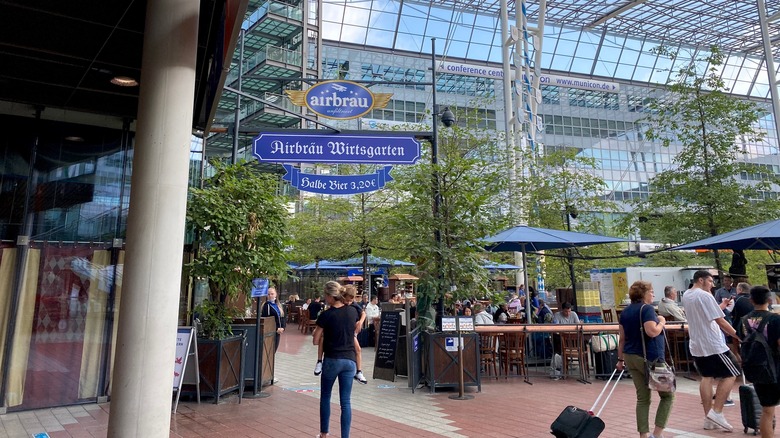
PIRAMON SIENGCHAREON/Shutterstock
If you like to fly wearing lederhosen or a dirndl — the quintessentially Bavarian outfits that have become synonymous with Oktoberfest — then you should definitely book a flight from this German city. Munich Airport is home to Airbräu, a restaurant that is so much more than a place to grab a bite to eat. Yes, you can get food here, dishes like dumplings with roast pork, but next door to the main eating area is a beer garden. It’s covered, so it’s good to visit in the rain, snow, or on a searingly hot day, and it even has a brewery onsite.
While supping a brew, travelers can watch live shows, which could be local bands or stand-up comedy (we suggest polishing up on your German just to be sure you’ll understand something). If you find that your teeth are hurting after guzzling all those liquid calories at Airbräu, you can head to a different part of the airport to see a dentist. Yes, there is a full-service dental outfit at Munich Airport.
New York
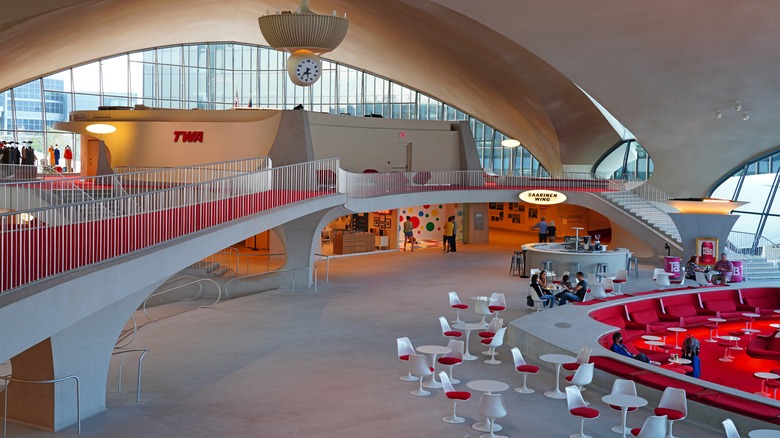
EQRoy/Shutterstock
Three airports serve New York City, but John F. Kennedy International Airport (referred to simply as JFK) is where a landmark former terminal has been invigorated with a new lease of life and a new purpose. But first, let’s start with the background. When it opened in the 1960s, the Trans World Airlines (TWA), designed by Finnish starchitect Eero Saarinen, was seen as a ground-breaking piece of architectural prowess, a modernist structure whose sweeping form recalled a bird in mid-flight. Such is its significance that the terminal appears on the National Register of Historic Places.
The terminal eventually closed, with TWA going bust in 1992, but in 2019, it opened as TWA Hotel, a property that celebrates the glamor of travel. It’s a swish property right next to Terminal 5 and has a cocktail bar inside an old Lockheed plane, rooms with views of a runway, and a retro hair salon that is bright pink. For travelers with some time to kill, it’s a great spot to while away a few hours, while those with longer layovers or a shockingly early departure can book a room to catch some shut-eye.
Portland
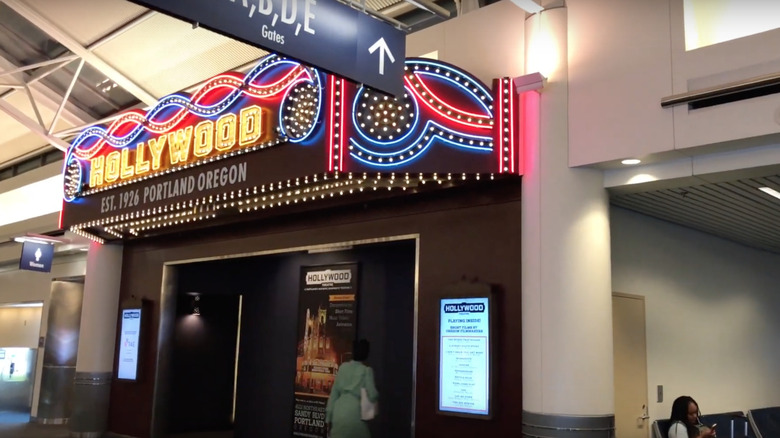
Scott Lukas / YouTube
A city with a solid independent movie scene, this metropolis in Oregon hosts an annual film festival in the fall that celebrates the voices, ideas, and creativity of small-scale movie productions. It is perhaps no surprise that local filmmakers have a forum at Portland International Airport, the gateway to Oregon’s largest city. A collaboration between the Hollywood Theatre, an iconic venue in Portland, and the city’s port authority, the small cinema in the airport is free for anyone to visit, though it only has 22 seats.
Its remit is to showcase short movies linked to the Pacific Northwest; films have to be a maximum of 10 minutes long and must have content suitable for all audiences (this includes children). While the filmmakers don’t have to be from the region explicitly, if they aren’t, then the film subject must be about the Pacific Northwest. This micro-cinema, as it’s been called, is located in the airport’s C Concourse. Despite its small stature, the screening room has Dolby Atmos capability — so the sound quality is excellent. Films change every quarter, so even if you’ve watched a short here before, you might be in for a new treat the next time you’re in town.
Seoul
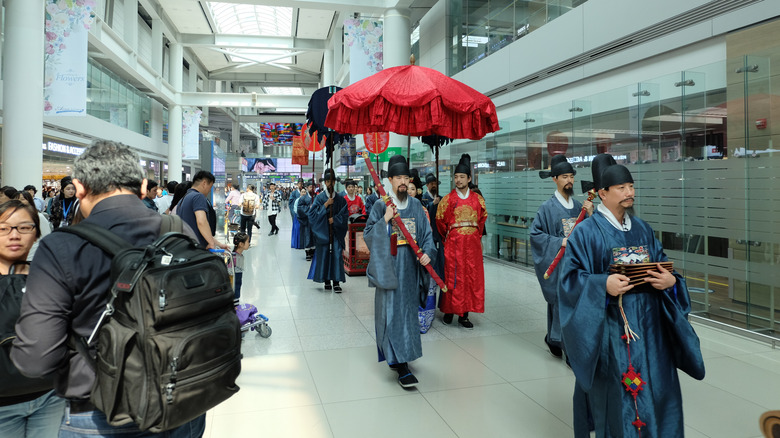
Darren Kurnia/Shutterstock
Incheon International Airport sits in the city of Incheon, to the west of the South Korean capital, but it is, nonetheless, the international air gateway to Seoul. In Terminal 1, near Gate 29, there is a Korean cultural center where travelers can catch final glimpses of local traditions before heading to their destination. The center sells traditional products for shoppers, from delicate fans to finely detailed figurines. Even more thrilling are the performances of Gugak, which loosely translates to “national music” but also extends to disciplines such as dance and song.
Here, the music comes courtesy of instruments such as the janggu (a double-headed drum struck on both sides), the gayageum (a plucked zither with 12 strings traditionally made of silk), and the reeded p’iri , usually made from bamboo. Together, they weave harmony and melody that will transport guests far away. Also, in Terminal 1, near Gate 16, there is a re-enactment of the royalty of the Joseon dynasty completing a parade — dressed in regal garb and carrying papers and paraphernalia that appear antique. The performers stroll through the terminal and happily take part in photo ops.
Singapore
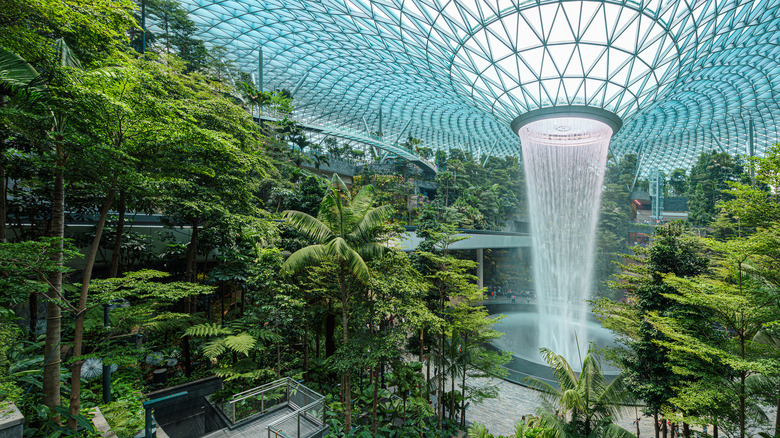
Em Campos/Shutterstock
A beautifully and smartly designed airport, Changi Airport regularly wins plaudits as one of the top airports in the world, most recently in the 2023 Skytrax World Airport Awards. It’s a place of efficiency and flair, with quick check-in, speedy security (mostly screening at each boarding gate, rather than one centralized screening at each terminal, so passengers move along quickly), and amazing shopping. Changi also has the Jewel, a huge, glass-sheathed orb that houses dining, recreation, a cinema, and more, and that opened in 2019.
Easily accessed from three of the airport’s four terminals (it actually sits right next to Terminal 1), Jewel has become a tourist destination in its own right. Its crowning glory is Rain Vortex, the world’s tallest indoor waterfall. The water drops more than 120 feet from a giant oculus, creating a vertical sheet of water that is hypnotic to watch any time — it’s gorgeous at night, during light shows that take place every day. The cascade is set within a terraced garden, a peaceful place just to sit, unwind, and enjoy the spectacle of it all.
Taipei
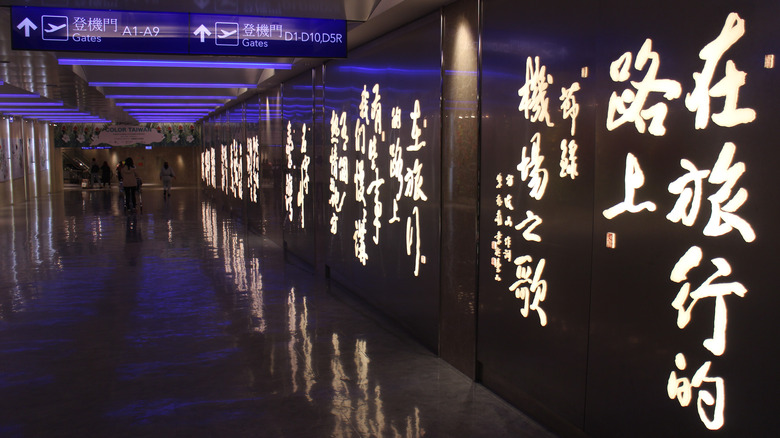
Lee peiming/Shutterstock
Keen observers of culture are often drawn to galleries and museums when they travel, a way to take the artistic pulse of a destination in a carefully curated space. But visitors to Taiwan can marvel at some mind-blowing art at Taoyuan International Airport, which serves the capital city, Taipei, in the island’s north. The art is everywhere and pleasingly varied, so visitors of all tastes will find something to appreciate. Large outdoor works include a grand aluminum loop that serves as a metaphor for the circle of travel or big figures exploring flight concepts.
Inside, visitors can see large, multicolored discs suspended from the ceiling of Terminal 3, their shape and arrangement reminiscent of jade pieces in the National Palace Museum. Many other artworks, unsurprisingly, tie in with the idea of flying, from curved pieces of fiberglass that mimic the actions and shapes of soaring birds to bubble-shaped contraptions that represent futuristic flying vessels. There are also pieces in passport control, baggage sites, and arrivals areas that excite visitors. These include bright, screen-based contemporary art and timeless flowing paintings depicting Taiwan’s landscapes through subtle shading and fine calligraphy.
Tokyo
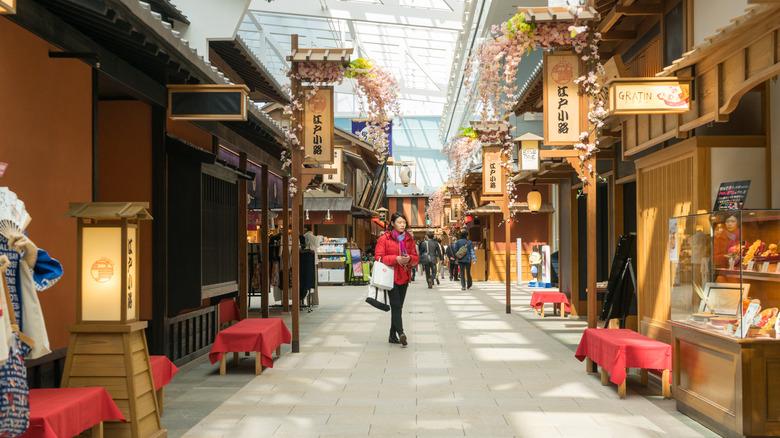
Sean K/Shutterstock
The capital of Japan has two international airports — Haneda and Narita — and it is the former that supplies visitors with some pretty cool places to check out. Visitors will get a snapshot of old Japan in certain areas of Haneda airport. In Terminal 1, a recent exhibition traced the evolution of Japan’s airport transportation authority and the growth of Haneda Airport, which first opened for business in 1931. In Terminal 3, perennial attractions include a recreation of a Japanese township dating from a period in the country’s history that goes back centuries.
Visitors will find a replica of a famous bridge, one that sits in the heart of Edo (now Tokyo), made of Japanese cypress wood and delicate folding screens. The panels portray images and places that were commonplace throughout the historical era of Edo. Also, in the same terminal, Sky Road connects a plaza to the airport’s Observation Deck. It is an exhibit across aeronautic time, with model planes from different carriers on display, all airlines that fly in and out of the airport.
Vancouver
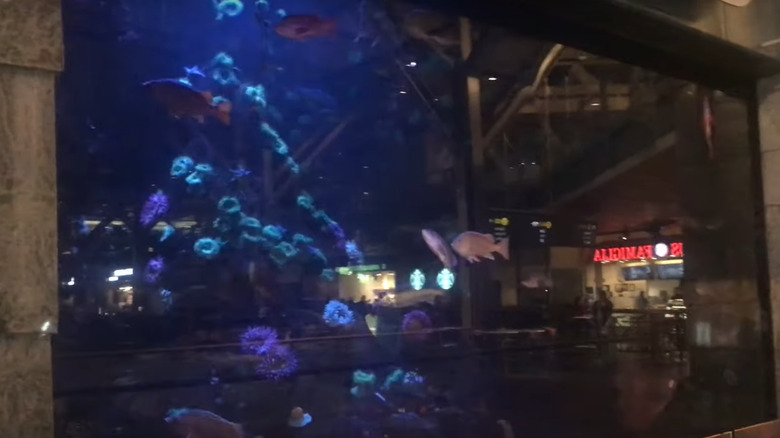
Strong and Beyond / YouTube
Canada’s gateway to Asia, Vancouver, is a coastal paradise, with forests, islands, and mountains all nearby, while the city is a lively metropolis that’s both urban and wild. At Vancouver International Airport, travelers can spend some moments marveling at the pretty aquarium, presented in collaboration with Vancouver Aquarium. Fashioned as a kelp forest and sitting under a First Nations piece of art, it opened in 2007 to provide a home to and showcase 20,000 animals and flora living in the water.
It’s a colorful, ever-changing waterscape with a rich variety of life inside the giant tank. Visitors might see the large-headed, fleshy wolf eel that likes to hide in nooks and crannies or the buffalo sculpin, a fish that can change its appearance in order to merge with the surroundings. Plant life includes the giant green anemone, which looks like a spiky cushion with a hole in the middle, or bat stars, which come in a variety of hues.
Zurich
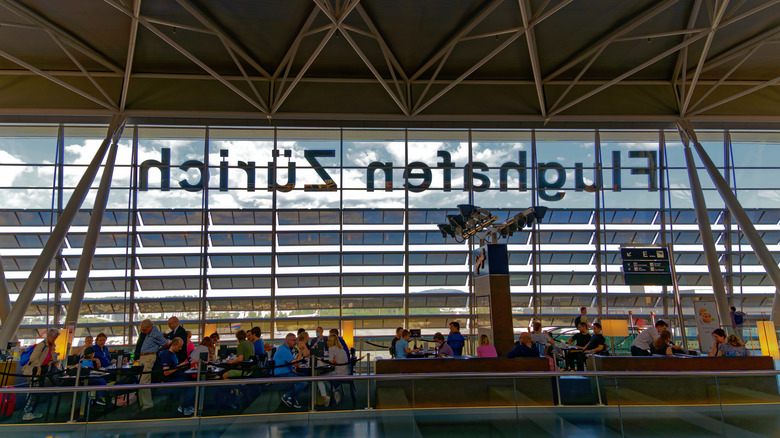
Michael Derrer Fuchs/Getty Images
The largest city in Switzerland has a population of less than 500,000 residents and an airport where visitors can feel like insiders. This is because Zurich Airport offers passengers a number of tours around the airport — all conducted with a guide — so that they can get a handle on the inner workings of the facility. Tours are mostly designed for groups, not individuals (with some exceptions), and prior booking is required. Among the options is a two-hour-long guided tour of the airport, with participants walking around various parts of the airport and tracing a passenger journey from check-in to the boarding gate.
Highlights of this tour are a stop at the observation deck and a dock area where the planes park nearby. The emergency services trip brings a guide and a firefighter to explain how aircraft blazes are controlled, giving visitors a chance to pore over emergency vehicles in their depot. Perhaps the most personal tour is the captain’s dinner, where a two-hour airport tour is followed by a dinner in a control tower with a former pilot. How cool is that?

